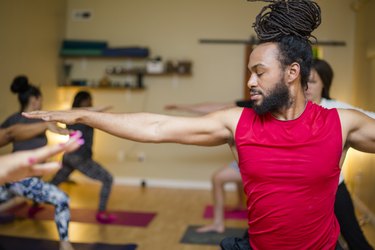
When I was in my 20s, I was what you'd call an overexerciser. I'd get up at 5 a.m. and head to the gym for at least an hour, then I'd walk two miles to and from work — even if it was below zero.
Saturdays were for long runs, and I'd trudge 15 miles. Who cares if it was storming out that day, I was sick with a terrible cold or my shin splints made me limp along? If I was asked to go out at night, I said no; I knew I couldn't come home late and skip my workout the next morning.
Video of the Day
Video of the Day
And yet, I was applauded for my efforts and dedication. No one realized what was really going on: My commitment to exercise was not a sign that all was well. I had an unhealthy relationship with exercise that was hurting me, mentally and physically.
"We really live in a society where it's assumed that everyone is not moving enough. While data does show that many people would benefit from greater amounts of physical activity, there are some who would benefit from less," Dana Voelker, PhD, associate professor at West Virginia University and certified mental performance consultant, tells LIVESTRONG.com.
It starts with the false narrative that more is always better, she says, so that the experience of people who are overtraining and overexercising is ignored.
"That compromises one's ability to detect what is excessive. It's easy to become proud of those habits, especially if everyone else around you is reinforcing it," Voelker explains.
And that's precisely why it can be tough to recognize that you might have this problem, too. Some of that is self-reinforcement, egged on by technology.
"An unhealthy relationship with exercise can definitely fly under the radar in today's celebratory culture of more is better and gaining badges or blue dots on exercise apps," says Michele Kerulis, EdD, professor of counseling and sports psychology with the Family Institute at Northwestern University.
What Does It Mean to Have a Healthy Relationship With Exercise?
A healthy approach to exercise means it fits your lifestyle — not the other way around — and that it aligns with your personal goals and needs. It's also an acknowledgment that your relationship with exercise may change throughout the years, and that's completely natural and to be expected.
For example, if you're postpartum, you may have a hard time accepting how your body changed during pregnancy and how that affected your strength, stamina and performance while running, lifting or another go-to activity.
Likewise, if you were diagnosed with a new health condition that changed how you can exercise, it may also be difficult to make a switch in exercise identity. That's where grace and flexibility come in. This type of acceptance toward change can be challenging, so know you're doing nothing wrong if you're struggling in these transitions.
Stepping back, though, exercise is about more than the workout itself. "My definition of a healthy relationship with exercise is characterized by joyful experience and exploration where body cues drive the amount, type, frequency and intensity of exercise versus extremely rigid and socially constructed rules," Voelker says.
Research shows people who are at the highest risk of overexercising are more likely to be depressed and experience more stress compared to those with healthier outlooks on exercise, according to a June 2018 study in Addictive Behaviors Reports.
Those who are at a high risk of exercise addiction are more likely to say they exercise often (8 hours per week compared to 5 hours per week), push through pain and injury and fear getting a new injury compared to those who were at the lowest risk of exercise addiction.
They may also be more likely to use exercise to regulate their emotions and to experience a depressed mood on days that they can't exercise.
For me, my relationship with exercise was in a bad place for years, and correcting it is a journey that can take time and work. But it's worth it for your health, happiness — and yes, even your fitness goals.
Here's how to build a healthy relationship with exercise:
1. Establish Your Reasons for Exercising
Think about why you want to exercise and ask yourself where you learned your attitudes toward exercise. Is it because people say that it's "good for you" or that you should exercise in order to look a certain way?
Depending on your responses, you may benefit from speaking to a mental health professional, especially if an exercise routine has become punishing, unhealthy or unmanageable.
A mental health professional who specializes in eating disorders or sports and exercise psychology can help lend unique insight into what's going on and guide you through the process of developing a healthier relationship with exercise.
"One of the first steps is becoming aware that there is an alternative. This isn't the only way to live, and it's important to have a willingness to explore those alternatives," Voelker says.
That means if you're afraid to step out of your current exercise routine, you might feel as if you should ignore the physical or mental cues that you're pushing yourself too hard or doing too much. But change is possible, and you can develop a better relationship with exercise. It just takes work, and that work might feel uncomfortable at times.
In addition, Kerulis recommends finding a certified personal trainer, who can help you create a healthy exercise plan focused on your goals and explain the importance and function of recovery and easy days. These are not enemies to your progress — they are necessary for your success.
Related Reading
2. Listen to Your Body
It's easy to get caught up in the outside noise (often from social media fitness and wellness influencers) that tells you how to work out and when to exercise, Voelker says.
"What I find is that as we listen, negotiate and incorporate these 'be-like-me' messages internally, we lose the most important voice, which is our body," she says.
This also means it's OK to step out of your exercise routine sometimes to prioritize your personal needs before your workouts. Ask yourself this important question before moving: "What does your body want right now?" Voelker says. Remember you, and not your training plan, know your body best.
When you slow down and cue in, your body will tell you if it's on the brink of fatigue. It will let you know when you need to sleep in instead of getting up in the morning to work out, when that hip pain isn't normal and you need to scale back on running or if you need a rest day or to do restorative yoga instead of an intense cardio workout after a busy week.
3. Embrace Rest
"It's so important for people to understand how we actively build physical fitness through exercise, and also how we can sustain health through tapering down and rest," Kerulis says. A common fear many people have toward exercise recovery is it will get them out of shape or slide them further from their goals.
Rest, Kerulis explains, is a crucial component of fitness that drives the gains of the work you're doing. That's because recovery allows your body to repair muscles and build them back stronger. As a result, it will boost your strength and cardio performance.
If you fear rest will sabotage your fitness goals, connecting with a licensed counselor can help you navigate these emotions, and how your sense of self-worth or self-esteem may be tied to your physical activity, Kerulis says.
4. Practice Self-Compassion
Part of your experience with unhealthy exercise might be the self-flagellation of what happens when you don't do your regularly scheduled workout or you don't perform up to (your) par.
Rigid adherence to an exercise program can become self-punishing. What's more, if you're chasing big goals beyond your current fitness level or experience an injury, you may be more likely to get down on yourself if these goals seem out of reach.
"Building a better relationship is about relearning to give yourself compassion," Voelker says.
"My definition of a healthy relationship with exercise is characterized by joyful experience and exploration where body cues drive the amount, type, frequency and intensity of exercise versus extremely rigid and socially constructed rules."
Remind yourself it's OK if you missed a workout. It's OK you chose to leisurely walk your dog versus hop on the stair stepper for a sweaty session. You are inherently worthy of making that choice. It is done for your body and health — and is not a reflection of who you are as a person. (e.g. You aren't lazy.)
Also, don't forget to bring self-compassion, kindness and patience, during times of injury and illness, Kerulis adds. For example, if you're injured or sick, your body will require rest in order to get better. It is not a sign of weakness, that you don't have talent or that you won't bounce back.
5. Focus on Fun
What movement do you love — like really love? Reflecting on that can help people who feel they're overexercising, as well as those who have a negative relationship with exercise because they perceive it as one that's punishing and, well, unfun.
"Exercise, by its nature and purpose, is challenging, so finding something that is enjoyable about exercise can decrease the negative perception and can actually help exercise feel like a reward," Kerulis says.
Doing physical activity that feels rewarding and brings about joy — versus anxiety and shame — can help you stay active in ways that serve you better.
These are activities that make you feel great outside of the number on a fitness tracker or ticking off the next goal on your list. They are activities that you'd do anyway, even when you can't "keep score." Celebrating your ability to move and do the physical activities you really love can bring back that special spark.
"The solution may not be to stop exercise completely, but to approach and 'do' exercise differently," Voelker says. Ask yourself: What are exercise opportunities I haven't considered before?
If you're a runner, consider hiking a trail; if you like yoga, see if there are any outdoor yoga classes in your area. A change of environment can help make an activity that has become less enjoyable can reignite your love for it and make it more fun and interesting.
6. Shift Your Perspective
It's hard to hear yourself through the chatter fitspo spits out.
"Exercise can feel like something you have to do to get closer to this socially constructed and impossible body ideal," Voelker says.
Focus on being in the moment of your workout experience, rather than trying to chase after this type of abstract goal (that probably won't bring happiness).
When you're in a workout, notice the feeling of your heart pumping or the wind that blows through your hair as you run or ride your bike. Or look around in a class and make a note to appreciate how fired up you feel in this high-energy social environment.
While it's difficult to uncouple exercising with "body goals," know that you're not alone. It's important to keep in mind that your appearance isn't a reflection of how fit or strong you are. For example, you don't have to have six-pack abs to have a strong core.
Exercising in a healthy way has been shown to improve body image, according to a small July 2017 study in Psychology of Sport and Exercise. It makes you actually see your body differently, and physical activity also makes feel stronger, which increases your sense of accomplishment and empowerment. All of this can shift your perspective on your body to a more positive light.
7. Talk to a Professional
Having an unhealthy relationship with exercise can affect how you go about your everyday life and can also be part of an eating disorder.
Some signs that exercise is negatively affecting the way you live your life are: turning down invitations to go out with friends in order to exercise, fearing something social will prevent from a scheduled workout and restricting foods because you haven't burned enough calories through exercise.
In these cases, connecting with a licensed mental health professional can assist you in moving forward. "This person can help you process hard questions," Voelker says.
Was this article helpful?
150 Characters Max
0/150
Thank you for sharing!
Thank you for your feedback!






